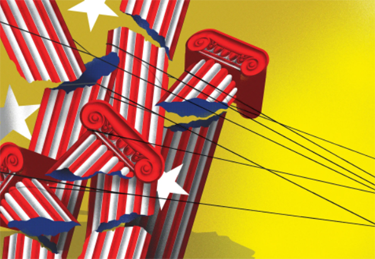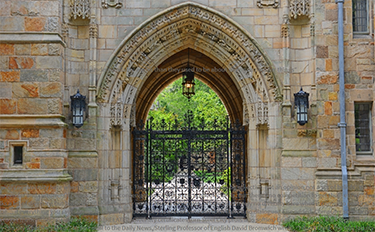Category Archive 'Conservatism'
20 Apr 2022

Oh me, oh my! Vanity Fair’s James Pogue visits the National Conservatism Conference and finds conspiring Peter Thiel, Curtis Yarvon, Amanda Milius (who must be the daughter of John Milius) and the rest of “the American right’s ‘radical young intellectuals,’ as a headline in The New Republic would soon put it, or conservatism’s ‘terrifying future,’ as David Brooks called them in The Atlantic.”
‘Why is it that whenever I see Curtis, he’s surrounded by a big table of incels?’ [Amanda Milius] asked with apparent fondness.”
18 Feb 2021

Melania Trump presented Rush with the Presidential Medal of Freedom.
Back in 2004, when Ronald Reagan died, his casket was carried in the hearse up the winding Simi Valley roads to his presidential library where the burial site was waiting. For 25 miles the narrow roads were lined with crowds of people standing in tribute to the former president. I recall one woman was holding up a large sign which bore the simple message: “Well Done.”
Rush Limbaugh was undoubtedly the greatest spokesman of Conservatism after Reagan, and I think the same sign would be equally applicable to Rush.
Ossa molliter cubent. “May the earth lay lightly on his bones.”
———————–
Mark Steyn put it rightly, paraphrasing Rush’s favorite line: “Talent returned to God.”
10 Oct 2020


For once the Times outdoes the Telegraph in its obituary of a colorful British figure.
If you have to die, it’s nice to have so as to be memorialized like Peregrine Worsthorne.
It was said of Sir Peregrine Worsthorne that he wrote as he dressed, with style and flamboyance. His bow ties, spongebag trousers and Leander socks were combined with wavy, collar-length silver hair, giving him the appearance of an aesthete on his way to the Athenaeum Club. To complement his exhibitionist tendencies he had an amused, fluting voice and, unusually for a High Tory Fleet Street editor, he was considered something of a flaneur and a bohemian. He was also a man whose engaging recklessness was, on occasion, his undoing.
As a commentator he could be salty, moralistic, reactionary, contrary and even, on occasion, self-contradictory, but he was rarely, if ever, boring or predictable. On Desert Island Discs in 1992 he chose as his luxury item a lifetime supply of LSD. His columns, meanwhile, were less formal argument than a series of assertions, often enough strikingly original and elegantly expressed, but sometimes merely silly, or so outrageous as to disturb even his most unflinchingly right-wing readers. For much of his career he longed for an editorial chair as well as a polemicist’s pulpit; when it finally came, its sweets were short-lived. …
In 1961 he became deputy editor of the newly founded Sunday Telegraph, a post he was to hold for the next 15 years (complementing Welch, who was deputy editor of the daily from 1964 to 1980). He was then associate editor until 1986.
He wrote in the first edition of the paper and, in some ways, thereafter became its personification. The values he was to espouse in his political columns for the next 36 years were not for the faint of heart: they were to include an argument that voluntary repatriation was the answer to Britain’s supposed immigration problems, for example, as well as a vigorous defence of Ian Smith’s white minority government in Rhodesia. His views on homosexualists, as he was wont to call them, could seem especially unpalatable. Despite his experience at his public school, Worsthorne castigated Roy Jenkins in one editorial for his tolerance of “queersâ€.
It became clear that the editorship he was waiting for would never come as long as Lord Hartwell was proprietor. Hartwell admired Worsthorne as a controversialist but did not think him staid or reliable enough for the editorial chair. There was some evidence for this view, in his professional and also in his private life. He had married in 1950 Claudia Bertrand de Colasse, a Frenchwoman previously married to an RAF officer. Yet, as he described with remarkable candour in his 1993 autobiography Tricks of Memory, it was far from a conventional marriage, and he was far from a faithful husband, with many liaisons, prolonged or casual. They had a daughter, Dominique, who is married to the potter Jim Keeling.
The Worsthornes mixed in a notably raffish set, including the journalists Henry Fairlie, George Gale and Paul Johnson and the dons Michael Oakeshott and Maurice Cowling. By some of these friends’ standards Worsthorne was temperate — an early bout of jaundice made heavy drinking impossible — but his life was chequered with comically untoward incidents. Over dinner in a Brighton restaurant, he and the late Vanessa Lawson, then the wife of Nigel Lawson, later of AJ Ayer, decided to exchange shirt and blouse while sitting at their table, an episode reported back to the proprietor by a mauvaise langue among his colleagues.
When appearing on an early-evening programme in 1973 to discuss the abrupt resignation of Lord Lambton from the government, he became the second man, after Kenneth Tynan, to use a well-known monosyllable on television, lightly remarking that the public did not “give a f***†about the affair. This brought a period of suspension from the paper’s pages.
In print, Worsthorne was almost as unpredictable. He was no dialectician, no scholar, indeed, and (despite his aspirations) no intellectual. His attempts at serious political thought were repetitious but persuasive even at column length, still more so in his one book in this vein, The Socialist Myth (1971).
But he was a wonderfully readable columnist, with a feline knack of puncturing specious arguments, of seeing through humbug with a single memorable phrase. He once argued ingeniously that the advertisements in newspapers were in a sense more truthful than the news pages. In the news, houses burn down and aircraft crash, killing and bereaving. In the ads, families live securely and happily in their homes, while flights land on time reuniting loved ones, a far more accurate reflection of everyday life. And it was Worsthorne who described the mood of the Thatcherite 1980s as “bourgeois triumphalismâ€, a phrase which has lasted longer than most coined by the left.
His leaders apart, Worsthorne was at his best writing Spectator diaries where he could be as irresponsible and malicious as he chose.
RTWT
20 Jan 2020


Jessica Custodio, at Campus Reform, reports:
While Yale University has been pushing for an increased diversity of staff based on race, gender, and sexual orientation, some faculty members are speaking out about the lack of political diversity.
The Yale Daily News spoke with professors at the Ivy League institution for their perspectives on data from the school’s Office of Institutional Research showing that faculty diversity is on the rise when it comes to gender and culture.
Many criticized what they claimed to be a lack of effort to have a faculty body surrounding the current political ideology seen throughout the nation. The publication referenced a 2017 survey revealing that close to 75 percent of Yale professors self-identify as liberal with less than 10 percent identifying as conservative.
“Yale talks a lot of diversity, but basically all that diversity means here is skin color… there’s definitely no diversity here when it comes to politics,†said history professor Carlos Eire.â€
“The liberal point of view is taken to be objective-not an opinion, not a set of beliefs, said Eire, adding that his own views are nonpartisan, “There’s an assumption that goes unquestioned that if you’re not part of the herd groupthink there’s something wrong with you.â€
“[It’s] not helpful if you want to have an open society with creative and productive political dialogue… if everything you say is immediately invalid because you are not virtuous then there’s no dialogue,†Eire added.
Computer science professor David Gelernter agreed with his colleague, saying that the political diversity at Yale is “0 percent†and that there are “few conservatives, including prominent ones.â€
“Of course, not many conservatives exist in most academic fields. But there’s no competition to get them either,†Gelernter added.
English professor Mark Oppenheimer spoke of his experience attending Yale as a student and compared it to the state of affairs today.
“My sense today is that the social cost that one would pay for having certain conservative views is very strong… and that effectively is a form of censorship, because to say people can say what they want, but they might pay for it by having far fewer friends, or being shunned, is not really to say that they can say what they want.â€
RTWT
18 Jun 2019


Nicholas Phillips, at Quillette, delivers up a hearty serving of old-fashioned curmudgeonly skepticism of the benignity of all technological change. No Robotic Communism for him!
When forecasting the future, perhaps the only thing that can be trusted is the emergence of unprecedented, unpredictable events that violate past trends. On the eve of the 2008 subprime mortgage crisis, none of the models used to forecast house prices accounted for the possibility of a price collapse—for the simple reason that no such collapse had ever happened. Price data was historical, and extrapolating that history into the future rendered us blind to the possibility that something ahistorical might happen. Or as Pessimists Archive unwittingly put it: the possibility that “this time it’s different.â€
But techno-optimists take the exercise a step further, by using data about one thing to forecast the future of an entirely different thing. This moves us from the flawed to the absurd. For instance, when techno-optimists compare anxiety over driverless cars to the protests of the horse-and-buggy industry over the automobile, they ignore the ways that driverless cars implicate fundamentally different problems than did automobiles. Driverless cars stand ready to collect immense amounts of personal data about the habits of their passengers, and their networked structure creates serious national security risks. What could the successful debut of the automobile in the early 20th century possibly tell us about that?
The political philosopher Gerald Gaus argues that the less precedent there is for some practice working, the less reason there is to prefer it. In the case of new technologies that implicate brand-new problems, the data we have about the success of past technologies is simply irrelevant. History gives us no reason to prefer a world in which, for example, most manual work is automated. It’s never happened before.
We draw spurious historical analogies precisely because it’s easy. If we can say that Change A is just like Change B, which went fine, it allows us to avoid grappling with the actual qualities of Change A. Argument by analogy displaces argument on the merits. It’s far more convenient to assert that past change was good, present change is just like past change, therefore present change is good too.
Unfortunately, by any objective measure, most new things are bad. People are positively brimming with awful ideas. Ninety percent of startups and 70 percent of small businesses fail. Just 56 percent of patent applications are granted, and over 90 percent of those patents never make any money. Each year, 30,000 new consumer products are brought to market, and 95 percent of them fail. Those innovations that do succeed tend to be the result of an iterative process of trial-and-error involving scores of bad ideas that lead to a single good one, which finally triumphs. Even evolution itself follows this pattern: the vast majority of genetic mutations confer no advantage or are actively harmful. Skepticism towards new ideas turns out to be remarkably well-warranted.
The need for skepticism towards change is just as great when the innovation is social or political. For generations, many progressives embraced Marxism and thought its triumph inevitable. Future generations would view us as foolish for resisting it—just like Thoreau and the telegraph. But it turned out that Marxism was a terrible idea, and resisting it an excellent one. It had that in common with virtually every other utopian ideal in the history of social thought. Humans struggle to identify where precisely the arc of history is pointing.
Techno-optimists would likely prefer to put aside failed products and ideologies and consider instead those innovations that have already proven successful. We’re talking about the iPhone, after all. Is popular adoption of an innovation reason enough to suspend skepticism? No—we turn out to be quite bad at predicting the full impact of even our most successful ideas. Adding lead to gasoline made automobile transportation more efficient, but it caused widespread brain damage and may have been responsible for the 20th century crime boom. Freon in refrigerators punched a hole in the ozone and had to be banned by international compact. Fossil fuels, one of the most successful product innovations in history, are experiencing what might politely be called a re-evaluation.
Another massively successful innovation undergoing a re-evaluation of its own is the internet itself. Optimists promised emancipation: knowledge would be democratized and civil discourse would flourish. Now, we understand that the internet is also a highly effective system of control. Incentives to commodify personal information have resulted in more and more of our daily lives becoming subject to data collection, transforming our economy into a surveillance ecosystem. This renders our conduct “visible†to states, which can punish us for it—as China is doing now through its dystopian “social credit†system. The whole thing could turn out to be a terrible mistake—we don’t know, because we’ve never had to solve this problem before. The fact that we previously solved the problem of the telegraph is irrelevant. One could probably fill a podcast—call it the “Optimists’ Archiveâ€â€”with inappropriately rosy predictions about the wonders of new technology.
We are engaged in a giant social experiment. For 99 percent of the time humans have lived in settled societies, life in each generation was essentially like life in the generation before. Stasis, not change, was the rule. Now, for the first time, we live differently, and the gap between the generations grows wider as the pace of change grows faster. Can this continue indefinitely? We have no precedent for that working. Analogies to history are analogies to nothing at all. We might as well analogize the driverless car to the hand-ax.
Instead of empty analogies, the only way to survive change is to have a vigorous debate about the merits of our new ideas—precisely the kind of debate that techno-optimists want to foreclose by appealing to history. We might ask instead: what does this new thing do to us? Do we understand enough to answer that question? If not, on what basis does our confidence rest? Debate on the merits is essential to distinguishing good ideas from bad ones. And for that, you need the people that techno-optimists most loathe: conservatives.
RTWT
17 Sep 2018


Andrew Sullivan, in last Friday’s weekly editorial, says “America Desperately Needs a Healthy Conservatism,” and tells us what he thinks that consists of.
In today’s America, this conservatism is completely under siege. The left will increasingly tolerate nothing that gets in the way of what it calls “social justice,†which far too often reduces individuals to their racial or class or gender identities rather than their merits, or character, or talents. The conservative approach to a multicultural and multiracial society is to keep our focus on the individual and do what’s best to help every individual, regardless of their race, gender, or whatever, to be part of our shared liberal democratic inheritance. Conservatism is about enfolding the new into the old, sustaining a society’s coherence and cohesion, while being extremely tough on particular injustices against particular individuals, vigilant about corruption, and anguished when the criminal justice system loses legitimacy, because of embedded racism.
But conservatism is more deeply besieged by the Republican Party, its alleged harbor. If you consider the themes I’ve emphasized above, it becomes clearer that the GOP is not only not conservative, but actually dedicated to destroying that tradition. Republicans pursue the ideology of free markets and lower and lower taxation, regardless of its brutal assault on fiscal solvency, human dignity, social cohesion, and community life. They have nominated and protected a president who assaults the norms that conservatives revere, has contempt for existing institutions and sees the rule of law as a means to advance his own interests, rather than that of the society as a whole.
This is a man and a party that has such disdain for conserving anything that it is actively despoiling our landscape, enabling a climate catastrophe. It is a party that has generated crippling and everlasting debt — even in good economic times — in a way that makes a mockery of any compact between generations. It is a party that actively endorses cruelty as a policy tool, deploys fear as its prime political weapon, and insists that the opposite party has no legitimate right to govern at all. It is the party of torture, the absolute nemesis of the liberal inheritance, the party of corruption, propaganda, vote suppression, and barely masked bigotry.
I despise it because I am a conservative. I don’t believe that conservatism can be revived on the right (it has been thankfully sustained, by default, by the Democrats in recent decades) until this hateful philistine would-be despot and his know-nothing cult is gone. And by revived, I do not mean a return to neoconservatism abroad or supply side crack-pottery at home. The 1980s and 1990s are over. I mean a conservatism that can tackle soaring social and economic inequality as a way to save capitalism, restore the financial sector as an aid to free markets and not their corrupting parasite, a conservatism that will end our unending wars, rid the criminal justice system of its racial blind spots, defend liberal education and high culture against the barbarians of postmodernism and the well-intentioned toxins of affirmative action, pay down the debt, reform the corruption of religious faith, protect our physical landscape, invest in non-carbon energy, and begin at the local level to rebuild community and the spirit of American civil association.
Andrew’s thesis is summarized perfectly at the point where he writes:
The goal is not to stand athwart history and cry ‘Stop!’, as William F. Buckley put it. It’s to be part of the stream of history and say: slow it down a bit, will you?”
RTWT
In essence, Andrew Sullivan is reacting with indignation and hostility to the populism of Donald Trump, but in the course of defining his own position of opposition to Trump, he makes it clear that his version of supposed Conservatism also rejects the Conservatism of William F. Buckley, Jr., Barry Goldwater, and Ronald Reagan.
Andrew’s “Conservatism” is really the “Me, Too, Just a Little Less” style of Republicanism of Dwight Eisenhower, Nelson Rockefeller, and all the Establishment, Country Club-style Republicans of the Bad Old Days before the Conservative Movement took over the GOP and equipped it with principles and a backbone.
Andrew’s Conservatism finds its compass, not in the Constitution, the Federalist Papers, and the writings and debates of the framers, but in the editorial page of the New York Times.
Andrew’s Conservatism is intellectually uncritical. It accepts in every jot and tittle the consensus of the elite community of fashion. Junk science, Dualism, and the worship of Gaia, immolating billions to drive off this imaginary catastrophe or that? No problem. Andrew is on board.
Andrew’s Conservatism shares with our liberal establishment reliance on the radical hardcore Left as its conscience. Idealism and morality belong to that radical Left. Declining any of its edicts or demands endangers your moral standing and threatens the stability of society. We must wage war continually on intrinsically evil Bankers and Big Business. We must always regulate out of existence any stigmatized compound or element. We must always choose the emotional gesture expressing our love of Nature over energy or productivity, always disregarding crass calculations of costs and benefits.
We must become deficit hawks during any Republican Administration and deplore tax cuts. We must embrace Isolationism and Pacifism in our Foreign Policy, unless the Left wants to go after some reactionary regime.
Identifying exactly what is conservative in Andrew’s Conservatism is not easy. The best I can do is to point to Andrew’s implicit conviction that the national establishment inevitably is made up of the wisest and best people and therefore possesses the mandate of Heaven. Opposition to establishment culture and politics is intrinsically revolutionary and just plain bad form. Andrew’s Conservatism is really the Conservatism of the Vicar of Bray.
He tells us in the opening of his essay that he had just read Roger Scruton on Conservatism. If he did, he certainly was not really paying attention.
23 Dec 2017


Despite Donald Trump’s surprising list of real accomplishments, which I am obliged to admit distinctly exceed those of several recent legitimate and respectable Republican presidents, there are still a lot of carping, sneering professional conservative commentators out there, clinging to now pointless #NeverTrump irredentism.
Roger L. Simon argues that these people ought to start admitting they’ve been wrong, give the devil Trump his due, and close ranks with fellow conservatives. Winning major political battles and the culture war is a lot more important than Donald Trump’s aesthetics or continued proof of the superiority of certain people’s souls.
[I]t is time for the remaining NeverTrumpers to apologize for a reason far more important than self-castigation or merely to make things “right.” Donald Trump — whose initial victory was a shock, even, ironically, to those of us who predicted it — has compounded that shock by being astoundingly successful in his first year, especially at the conclusion. (He’s a quick study, evidently.) More conservative goals have been achieved or put in motion in eleven months than in any time in recent, or even distant, memory. It’s an astonishing reversal for our country accompanied by the beginnings of an economic boom.
But that same success is causing, it’s becoming increasingly clear, an equally determined, even virulent, reaction from the left. At first they too thought Trump was an ineffectual blowhard who would shoot himself in the foot, ultimately redounding to their advantage. Now that they have found that not to be the case, they are in a state of panic, fearing a defeat for their ideals that would set them back years, even decades. They cannot let this stand and are marshaling all their forces from the media to Hollywood to the academy, not to mention at least some of the investigative units of the FBI.
NeverTrumpers Ignore Trump’s Accomplishments
The next year seems poised to be an ideological duel as close to the death as we have seen in a long time. If the right does not win, the gains of 2017 will be stymied by the election of 2018 and completely washed away in 2020.
It’s an all-hands-on-deck situation and we need the NeverTrumpers’ help. We need — to borrow a hoary leftist term — a united front.
RTWT
11 Oct 2017


Matt Purple, managing editor of American Conservative, responds to recent demands for Gun Control from sort-of-conservatives Brett Stephens and David Frum writing respectively for those famous conservative organs The New York Times and the Atlantic.
Stephens and Frum aren’t technocrats calibrating the machine of progress; they’re Wayne Wheeler and Carrie Nation, throwing open our saloon doors and smashing our tumblers. Theirs is a moral crusade against what they perceive to be a national vice. America is sick and only they are enlightened enough to make it better. Perhaps that’s a bit flippant—some of our nation’s best (and worst) work has been done by those who set out to mend grand societal ills—but we should at least stop pretending that the kids-cup prescriptions of a Senator Chris Murphy can ever accomplish his jumbo-size ends. This is a nation with one firearm for every citizen, a thriving outdoorsman culture, a history of violent lawlessness, a frontier, a Second Amendment. Jamming those spokes is going to require a far larger stick than anything that fits through the ludicrously exaggerated “gun show loophole.â€
The reason many of us take the (authentically) Madisonian view—in addition to our leeriness over a total government monopoly on arms—is that we reject such a crusade as impractical. We see it as premised on a fundamentally false conception of America, one that glosses over her indelible traditions of individualism and defiance. We worry it will result in more polarization and violence rather than less. We observe, too, that the public has lately grown weary of elite designs on their values, their pronouns, their national anthem—enough to elect Donald Trump in the hopes of making it all stop. Presumably an additional betterment campaign against their guns would be met with the same aggravation and pushback. It’s your move, gentlemen, but is this really where you want to go right now?
RTWT
09 Sep 2017


Kurt Schlichter says conservatives are now woke and recognize that a lot of Republicans have a standard operating procedure of double-crossing us.
“Oh, George W. Bush was a true conservative!†Good guy, yes, but he brought us two unwon wars (only one of necessity) and “compassionate conservatism.†Of course, “compassion†always means that normal people get another rock in their ruck. Then there was John McCain, who lied to our faces on Obamacare’s repeal so more Senate hacks wouldn’t have to go on record doing so. And last, and arguably least, there’s Mitt Romney, Mr. Thank-You-Candy-May-I-Have-Another, who never misses a chance to virtue signal for the benefit of the same people who said he gave someone cancer. Oh, and their bright idea for 2016? Jeb! He was an act of love upon us normals all right.
See, we’re done. We’re woke and feeling about you hacks just like you feel about us. Think about that. The clock is ticking. Look at Jeff Flake. At this point, I don’t even care if his opponent, somewhere down the road, will have to deny being a witch. In fact, his primary opponent could get up at the first debate in a sweatshirt reading “PROUD HOGWARTS GRAD,†wave a wand, announce without irony that “The sorting hat assigned me to Hufflepuff!†and I’d still send her money. Because even if she was crazy (and she’s not – she seems like a very nice lady who actually believes in conservative stuff ), she would still be a million times better than that back-stabbing, braying doofus she’s running against. Heck, she’s already crushing the Arizona squish into utter squishiness in the polls – think of what she could do with some spells.
The GOP establishment will never learn, partly from denial and partly because a lot of its members are kind of dumb. For example, that smarmy dope Paul Ryan, when he isn’t trying to make sure foreigners are treated better than Americans, is still pushing the moronic “You could do your taxes on a postcard!†hack cliché when, of course, everyone knows that all those extra pages are filled with the deductions that make people who work pay less. I’ll toss my taxes to my accountant and keep my home mortgage, charitable, and state tax deductions instead of losing them so big GOP donors can pocket some more dough – thanks though, Passive Paul! Postcard taxes – sheesh, 1996 called and it wants its total defeat back.
Look normals, we’re in for the long haul here – hopefully not one that ends violently for our divided country, which it absolutely could. Those are the stakes, and that is why we can’t just walk away from this game. We can’t hide and wait it out. We either get in there and win or we lose everything. Step One was getting woke. Step Two was electing Trump. Step Three is regulating the Republicans. Slowly and surely, we’re going to need to purge these punks from our team.
RTWT
The Establishment GOP elected George W. Bush who threw away our political advantage and elected Obama. The Establishment GOP nominated John McCain and Mitt Romney who couldn’t beat Obama. We have them the White House and both houses of Congress and they still wouldn’t kill Obamacare.
What choice do we have? We have to go with the Alt-Right over them.
22 Oct 2016


Barry Goldwater, Ronald Reagan, William F. Buckley, Jr.
Matthew Continetti, in a must-read essay, reviews the often-fraught relationship between mainstream intellectual Movement Conservatism and its populist New Right allies.
Republicans have walked this tightrope for decades. When the party has integrated the issues, goals, and tactics of the New Right into its campaigns, it has been remarkably successful. Think 1968, 1972, 1980, 1984, 1994, 2010, and 2014. But there also have been signs, on the presidential level most clearly, that the alliance with populism is bringing diminishing returns. The GOP is on the brink of losing the popular vote in six out of seven presidential elections despite its current nominee running precisely the type of campaign the New Right has wanted to see for years. And this election is likely to return to office a Republican House majority that is more anti-Establishment, more hostile to compromise, more suspicious of institutions and elites than the one we have today.
This is the crisis of the conservative intellectual. After years of aligning with, trying to explain, sympathizing with the causes, and occasionally ignoring the worst aspects of populism, he finds that populism has exiled him from his political home. He finds the détente between conservatism and populism abrogated. His models—Buckley, Burnham, Will, Charles Murray, Yuval Levin—are forgotten, attacked, or ignored by a large part of the conservative infrastructure they helped to build. He finds the prospect of a reform conservatism that adds to our strengths while ameliorating our weaknesses to be remarkably dim. …
From the Panama Canal to the Tea Party, from Phyllis Schlafly to Sarah Palin, the conservative intellectual has viewed the New Right as a sometimes annoying but ultimately worthy friend. New Right activists supplied the institutions, dollars and votes that helped the conservative intellectual reform tax, crime, welfare, and legal policy. But that is no longer the case. Donald Trump was the vehicle by which the New Right went from one part of the conservative coalition to the dominant ideological tendency of the Grand Old Party. …
Trump deploys New Right symbols and tropes. His antagonism toward the Eastern establishment is obvious. …
Immigration, which emerged as a social issue at the turn of the twenty-first century, was key to Trump’s success. So was his role as outsider, independent critic of the rigged system, scold of elites, avatar of reaction. The apocalyptic predictions, the dichotomy between makers and takers, even the idea of seizing Arab territory and “taking the oil†comes straight from Bill Rusher’s 1975 Making of the New Majority Party. The relentless hostility toward the media, both liberal and heterodox conservative, the accusation that it, the government, and the financial sector is engaged in a criminal conspiracy with Hillary Clinton, the denigration of Speaker of the House Paul Ryan, the appeal to supporters of democratic socialist Bernie Sanders, the charge that the “global power structure†has “stripped†manufacturing towns “bare and raided the wealth for themselvesâ€â€”this is adversarianism in its purest, most conspiratorial, most totalistic form.
The attacks on National Review, on George Will, on conservatives with elite educations, on conservatives granted legitimacy by mainstream institutions is a replay of the New Right rhetoric of the 1970s. Names have been added to the list of Republicans in Name Only, of false, cuckolded conservatives, but the battle lines are the same. On the one hand are the effete intellectuals based on the East Coast, shuttling up and down the Acela corridor, removed from the suffering of the average American, ignorant of the social issues, amenable to social engineering, fat and happy on a diet of foundation grants, magazine sinecures, think tank projects, speaking engagements. On the other are the blue-collar radio and television hosts with million-dollar contracts, the speechwriter for Wall Street banks who uses a pseudonym to cast aspersions on the feckless conservative elite, the billionaire-supported populist website that attacks renegade Jews, the bloggers and commenters and trolls estranged from power, from influence, from notoriety, from relevance, fueled by resentment, lured by the specter of conspiracy, extrapolating terrifying and chiliastic scenarios from negative but solvable trends.
It is the same discourse, the same methods, the same antinomianism, the same reaction to demographic change and liberal overreach that we encountered in the 1970s. The difference is that Donald Trump is so noxious, so unhinged, so extremist in his rejection of democratic norms and political convention and basic manners that he has untethered the New Right politics he embodies from the descendants of William F. Buckley Jr.
The triumph of populism has left conservatism marooned, confused, uncertain, depressed, anxious, searching for a tradition, for a program, for viability. We might have to return to the beginning to understand where we have ended up.
Read the whole thing.
05 Oct 2016

 
Harry Jaffa — Allan Bloom
Jeet Heer has an interesting article, in the New Republic, on the coastal divide between Straussians.
Charles Kesler, a professor of government at Claremont McKenna College and the editor of the Claremont Review of Books, wrote in the spring issue of the journal that America may be facing “the Weimar problemâ€: “Has the national culture, popular and elite, deteriorated so much that the virtues necessary to sustain republican government are no longer viable? America is not there yet, although when 40% of children are born out of wedlock it is not too early to wonder.†It’s no accident that this question is raised in an essay making case that Donald Trump isn’t as terrible as mainstream conservatives like William Kristol fear he is. If you live in the Weimar Republic, Kesler implicitly argues, a figure like Trump could come as a relief.
A similar mood of crisis was voiced by Angelo Codevilla, a retired professor of international relations, in a recent online essay for the Review. Codevilla argues that regime change of a terrible kind has already occurred, with the American elite destroying what was great about the country. By this account, America needs a new revolution. Codevilla supports Trump but fears that he’s not up to the task of revolutionary change required:
In fact, the United States of America was great because of a whole bunch of things that now are gone. Yes, the ruling class led the way in personal corruption, cheating on tests, lowering of professional standards, abandoning churches and synagogues for the Playboy Philosophy and lifestyle, disregarding law, basing economic life on gaming the administrative state, basing politics on conflicting identities, and much more. But much of the rest of the country followed. What would it take to make America great again—or indeed to make any of the changes that Trump’s voters demand? Replacing the current ruling class would be only the beginning.
Kesler and Codevilla are West Coast Straussians, one of two rival factions of intellectuals who revere Leo Strauss, the German-born political philosopher who died in 1973. Whereas East Coast Straussians have been heavily oriented towards establishment Republicans like George W. Bush, and thus tend to be #NeverTrump—Kristol’s Weekly Standard has been sharply anti-Trump and Paul Wolfowitz has said he might vote for Hillary Clinton—there’s considerable support for Trump among West Coast Straussians. They justify their support of Trump by saying that America is in such deep trouble it needs regime change. To borrow a Trumpian phrase: “What do you have to lose?â€
In these West Coast Straussians we see the emergence, for the first time since the Southern secessionists of the 1850s, of a group of conservative American intellectuals who advocate overthrowing the existing political order. Under Bush, Americans saw what Straussian ideas of regime change could do abroad. Under Trump, we might see the same urge for regime change applied to America itself. …
After Leo Strauss died in 1973, his followers divided into two factions, creating the infamous “Crisis of the Strauss Divided.†And the best way to understand the divide between West Coast and East Coast Straussians is through the quarrel between Harry Jaffa and Allan Bloom, who were the respective heads of the rival schools. …
The disputes between Jaffa’s West Coast Straussianism and Bloom’s East Coast Straussianism can be discussed along philosophic lines: Is America, as Jaffa believes, grounded in ancient philosophy or was the American founding, as Bloom would have it, built on the low but solid ground of early modern philosophers like Hobbes and Locke? Does the survival of America depend on the virtue of the people, as West Coast Straussians believe, or in the maintenance of constitutional norms, as East Coast Straussians believe? But the dispute can also more easily be understood in terms of the familiar social divide in the Republican Party. West Coast Straussians are the grassroots activists, grounded in social conservatism and ultra-nationalist in foreign policy. Sociologically, East Coast Straussians are more aligned with the party elite, and tend to be found in Washington think tanks and serving as career bureaucrats.
Read the whole thing.
I’m not a Straussian myself, but the nomination of Donald Trump has certainly similarly divided me from a long-time blogging kindred spirit who, coincidentally perhaps, lives on the West Coast, and many others.
I’d say, “If you live in the Weimar Republic,” you had better be pretty damned careful about allying with the ignorant and resentful mob to put into power a demagogic populist and narcissistic strongman determined to supplant previous legitimate sources of leadership and authority and contemptuous of traditional ethics as well as of constraint on the basis of theory and ideas. They elected somebody of the sort in 1932 in the real Weimar Republic, and the results were not pretty.
20 Sep 2016

Escapism is laudable, perhaps the only truly honorable course for humane men — but only for them. Those who remain in the world, if they will not surrender on its terms, must maneuver within its terms. That is what conservatives must decide: how much to give up in order to survive at all: how much to give up in order not to give up the basic principles. And, of course, that results in a dance along a precipice. Many will drop over, and always, the cliff dancers will hear the screaming curses of those who fall, or be numbed by the sullen silence of those, nobler souls perhaps, who will not join the dance.
–Whittaker Chambers, Odyssey of a Friend, p.83.
Your are browsing
the Archives of Never Yet Melted in the 'Conservatism' Category.

Feeds
|
















